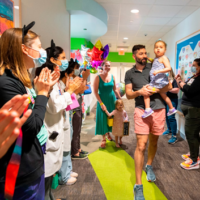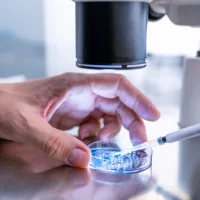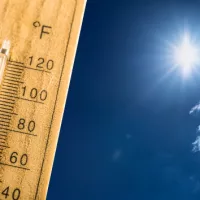 iStock/Thinkstock(NEW YORK) — The Ebola virus arrived in a fifth country this week, after health officials reported that a man with Ebola symptoms showed up at a hospital in Senegal. The man was a student from Guinea, where the virus has affected 648 and killed 430.
iStock/Thinkstock(NEW YORK) — The Ebola virus arrived in a fifth country this week, after health officials reported that a man with Ebola symptoms showed up at a hospital in Senegal. The man was a student from Guinea, where the virus has affected 648 and killed 430.
Across West Africa, the virus has already killed more than 1,552 people in Liberia, Guinea, Sierra Leone and Nigeria, according to the World Health Organization.
While doctors and government officials have spent months trying to stop the outbreak, the infections continue to rise: More than 40% of the total cases in this outbreak have occurred within the past 23 days.
Here are things you should know about the outbreaks as fears continue to mount in Africa and beyond.
Congo Reports Possible Ebola Cases, Deaths
The Democratic Republic of Congo may be 800 miles from the Ebola outbreak in West Africa, but the Central African country has reported 24 suspected cases, including 13 deaths. None of the patients or their close contacts had traveled to West Africa, according to WHO.
“At this time, it is believed that the outbreak in [the Democratic Republic of Congo] is unrelated to the ongoing outbreak in West Africa,” the agency said in a statement, adding that samples from the Congo cases are being tested for the virus.
The first known case in Congo occurred in a pregnant woman who became ill after butchering a “bush animal” that her husband killed, according to WHO. She died on Aug. 11. Health care workers who tended to her, including a doctor, two nurses and a ward boy developed similar symptoms and died, the agency said.
Ebola was first discovered in the Congo in 1976 and is named for the Ebola River.
African Patients Who Got ZMapp to Leave Hospital
There’s no cure for Ebola, but at least six people have received the experimental drug ZMapp: American health workers Dr. Kent Brantly and Nancy Writebol, a Spanish priest, two African doctors, and one African nurse. Brantly and Writebol survived but the Spanish priest and one of the African doctors did not.
The remaining African ZMapp recipients were expected to be discharged from the hospital this week.
Still, experts say it’s unclear whether ZMapp — a cocktail of three antibodies that attack the virus — actually helped those who received it. Before Brantly received his dose, the drug had only been tested in monkeys.
“Frankly we do not know if it helped them, made any difference, or even delayed their recovery,” said Dr. Bruce Ribner, director of Emory University Hospital’s infectious disease unit, where Brantly and Writebol were treated.
Officials Warn of ‘Shadow Zones,’ ‘Invisible’ Cases
The Ebola outbreak is already the deadliest on record, and WHO officials say the impact may be far worse than reported.
The number of known infections — currently 2,615 — is underestimated because of those who hide the infected and bury the dead in secret, WHO said in a statement Aug. 22. The number also excludes so-called “shadow zones,” which are rumored to have Ebola cases that go unconfirmed because of community resistance and a lack of medical staff, the agency said.
Health officials also suspect an “invisible caseload” in Liberia because new treatment facilities are filling with previously unidentified Ebola patients as soon as they open.
One in Four Americans Fears Ebola Outbreak, Poll Shows
About a quarter of Americans fear that they or someone in their family will come down with Ebola in the next year, according to a Harvard School of Public Health poll.
Harvard and SSRS, an independent research company, conducted the poll of 1,025 adults last week and found that 39 percent of respondents feared a large Ebola outbreak in the United States.
According to the poll, 68% of Americans thought the disease could spread “easily” and 33% said they thought there was an available treatment for it, both highlighting a lack of understanding about Ebola in this country.
In reality, the virus is only transmitted through contact with bodily fluids like blood and urine, and there is no cure. It’s unclear whether ZMapp, the unofficial drug given to the American Ebola patients, helped or hindered their recovery, experts say.
Officials Request Exit Screenings at Airports, Seaports
The World Health Organization has requested exit screenings at international airports, seaports and land crossings in all countries affected by the Ebola outbreak.
“Any person with an illness consistent with [Ebola virus disease] should not be allowed to travel unless the travel is part of an appropriate medical evacuation,” WHO said in a statement. “There should be no international travel of Ebola contacts or cases, unless the travel is part of an appropriate medical evacuation.”
Ebola symptoms include fever, weakness, muscle pain and sore throat, before they progress to vomiting, diarrhea and rash. Some people may also experience bleeding.
The WHO Ebola Emergency Committee advised against international travel or trade restrictions at this time.
Governments Are Reviving the ‘Cordon Sanitaire’
Officials from Guinea, Sierra Leone and Liberia have implemented a “cordon sanitaire” or sanitary barrier — a cross-border isolation zone designed to contain people with the highest infection risk.
The tactic, used to prevent the spread of plague in medieval times, literally blocks off an area thought to contain 70% of the epidemic. But some experts say there’s little proof that isolation zones can prevent the spread of disease.
“It may not be sufficiently structured so it can prevent people from leaving,” said Dr. William Schaffner, an infectious disease expert at Vanderbilt Medical Center in Nashville, Tenn.
FDA Warns Against Fake Ebola Treatments
The U.S. Food and Drug Administration is warning people to avoid fake Ebola treatments and vaccines being sold online. The agency said products claiming to protect people from the infection began popping up online after the outbreak began in March.
“There are currently no FDA-approved vaccines or drugs to prevent or treat Ebola,” the agency said in a statement. “Although there are experimental Ebola vaccines and treatments under development, these investigational products are in the early stages of product development, have not yet been fully tested for safety or effectiveness, and the supply is very limited.
“There are no approved vaccines, drugs, or investigational products specifically for Ebola available for purchase on the Internet,” the FDA added. “By law, dietary supplements cannot claim to prevent or cure disease.”
Follow @ABCNewsRadio
Copyright 2014 ABC News Radio















